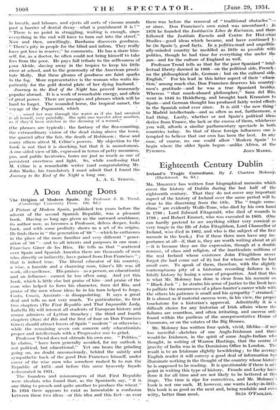Eighteenth Century Dublin
Ireland's Tragic Comedians. By J. Chartres Moloney. (Blackwood. 8s. 6d.)
MR. MOLONEY has written four biographical memoirs which cover the history of Dublin during the last half of the eighteenth century. That they do not cover any important aspect of the history of Ireland over the same period will be clear to the discerning from the title. The " tragic come- dians " are evidently Wolfe-Tone, who died by his own hand in 1798 ; Lord Edward Fitzgerald, who died of wounds in 1798 ; and Robert Emmet, who was executed in 1803. (One can hardly pretend to see anything either very _comical or very tragic in ihe.life of John Fitzgibbon, Lord Chancellor of Ireland, who died in 1802, and who is the subject of the first memoir in the book.) For if these three men have any im- portance at all—if, that is, they are worth writing about at all —it is because they are the expression, though at a double remove, of class and religion, of the inarticulate millions of the real Ireland whose existence John Fitzgibbon never forgot (he had come out of it) but for whose welfare he had small care. To speak of them, therefore, with the slightly contemptuous pity of a historian recording failures is to falsify history by losing a sense of proportion. And that this is what Mr. Moloney has done is clear from his memoir on " Black Jack " ; he strains his sense of justice to the limit here to palliate the meannesses of a place-hunter's career while with the others his patience is small and his sympathy " strained." It is almost as if material success were, in his view, the proper touchstone for a historian's approval. Admittedly it is 'a difficult choice for any historian of Irish affairs where the failures are countless, and Often irritating, and success' only found within the purlieus of the unrepresentative HOUse of Commons, or on the estates of the Big Houses.
' Mr. Moloney has written four quick, vivid, lifelike—if not too merciful—sketches of one Anglo-Irishman and three would-be Irishmen, in the spirit of some Anglo-Indian who thought, in writing of Warren Hastings, that the centre of gravity of India was in the Dominions Office in London. The result is to an Irishman slightly bewildering ; to the average English reader it will convey a good deal of information but illuminate nothing in the thought of the country whose history he is supposed to be reading. It is questionable if there is ariy point in writing this type of history. Fronde and Lecky have done it for all time and are not likely to be bettered at this `stage. The time is ripe for correctives, and Mr. Moloney's book is not one such. If, however, one wants Lecky-in-little, this book is as good as the next and, being readable and even
m.




































 Previous page
Previous page